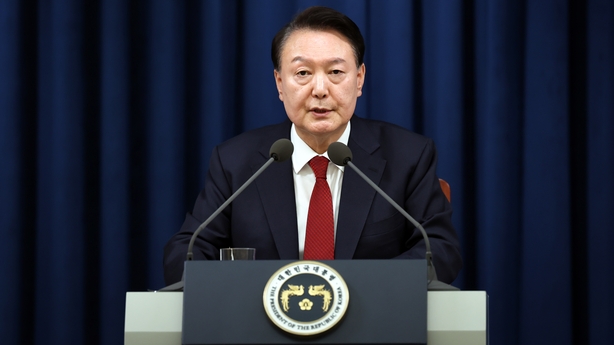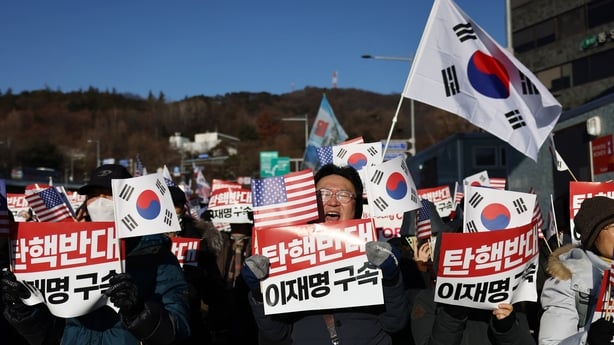South Korean investigators called off their attempt to arrest impeached President Yoon Suk Yeol over his failed martial law bid because of a standoff at his residence.
"Regarding the execution of the arrest warrant today, it was determined that the execution was effectively impossible due to the ongoing standoff. Concern for the safety of personnel on-site led to the decision to halt the execution," the Corruption Investigation Office said in a statement.
Earlier, authorities entered Mr Yoon's compound to execute an unprecedented arrest warrant, evading a crowd of protesters outside, but were confronted with presidential security forces inside.
It was unclear whether the Presidential Security Service (PSS), which has previously blocked access by investigators with a search warrant to Mr Yoon's office and official residence, would try to stop him being arrested.
Mr Yoon is under criminal investigation for insurrection over his 3 December martial law attempt that stunned South Korea, Asia's fourth-largest economy and one of the region's most vibrant democracies.
An arrest would be the first for an incumbent South Korean president.

Officials from the Corruption Investigation Office for High-ranking Officials (CIO), which is leading a joint team of investigators that include the police and prosecutors, had arrived at the gates of Mr Yoon's compound shortly after 7am (10pm Irish time yesterday), according to Reuters witnesses.
The CIO vehicles did not immediately enter the compound, partly due to a bus blocking the driveway.
Some CIO officials later filed through an opened gate on foot and past the bus, but then briefly faced another bus and an armoured vehicle further up the driveway, before they were moved.
Once inside the compound, the CIO and accompanying police faced cordons of PSS personnel, as well as military troops seconded to presidential security, media reported. South Korea's Ministry of National Defense said the troops were under the control of the PSS.
Yonhap news agency cited the head of the PSS saying the authorities are not allowed to search Mr Yoon's residence.

Mr Yoon's lawyer said in a statement that execution of an invalid arrest warrant against Mr Yoon is unlawful, and they will take legal action, without elaborating.
Protesters gathered in the pre-dawn hours near the residence, with the numbers swelling into the hundreds amid media reports that investigating authorities would soon try to execute the arrest warrant that was approved on Tuesday after Mr Yoon refused summons to appear.
"We have to block them with our lives," one was heard saying to others.
Some chanted "President Yoon Suk Yeol will be protected by the people," and called for the head of the CIO to be arrested.
Pyeong In-su, 74, said that the police had to be stopped by "patriotic citizens", a term Mr Yoon used to describe those standing guard near his residence.
Holding a flag of the United States and South Korea with the words "Let's go together" in English and Korean, Pyeong said he hoped incoming US President Donald Trump would come to Mr Yoon's aid.
"I hope after Trump's inauguration he can use his influence to help our country get back on the right track," he said.
The current arrest warrant is viable until 6 January and gives investigators only 48 hours to hold Mr Yoon after he is arrested. Investigators must then decide whether to request a detention warrant or release him.
Once arrested, Mr Yoon is expected to be held at the Seoul Detention Center, Yonhap News Agency said, citing the CIO.
Surprise martial law
Mr Yoon sent shockwaves through the country with a late-night announcement on 3 December that he was imposing martial law to overcome political deadlock and root out "anti-state forces".
Within hours, however, 190 MPs had defied the cordons of troops and police to vote against Mr Yoon's order. About six hours after his initial decree, Mr Yoon rescinded it.
He later issued a defiant defence of his decision, saying domestic political opponents are sympathetic to North Korea and citing uncorroborated claims of election tampering.
Kim Yong-hyun, who resigned as Mr Yoon's defence minister after playing a major role in the martial law decree, has been detained and was indicted last week on charges of insurrection and abuse of power.
Insurrection is one of the few criminal charges from which a South Korean president does not have immunity.
Mr Yoon's lawyers have said the arrest warrant was illegal and invalid because the CIO did not have the authority under South Korean law to request a warrant.
Mr Yoon has been isolated since he was impeached and suspended from power on 14 December.
Separate from the criminal investigation, his impeachment case is currently before the Constitutional Court to decide whether to reinstate or permanently remove him.
A second hearing in that case is scheduled for later today.

